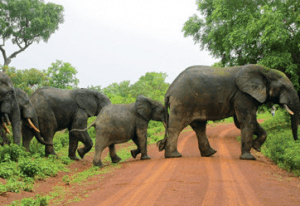Ghana Wildlife Bill yet to be finalized by Parliament
 Alhaji Amadu Seidu, Chairman of the Parliamentary Select Committee on Lands and Forestry, has said that the Wildlife Bill sent to Parliament was still being considered by the Committee and yet to be finalized.
Alhaji Amadu Seidu, Chairman of the Parliamentary Select Committee on Lands and Forestry, has said that the Wildlife Bill sent to Parliament was still being considered by the Committee and yet to be finalized.
He said when it was finalized it would be taken to the Ministry of Lands and Natural Resources for re-examination, after which it would then be taken back to Parliament and laid before the House.
Alhaji Seidu who said this at a day’s dissemination workshop for Eco-system Alliance (EA) programme, said any other issue that needed to be taken care of would come in the form of a Legislative Instrument from the Ministry.
The workshop was organized by Tropenbos International Ghana, an organization which aims at bridging the gap between forest policy, management and science, providing a forum for discussing forest issues, and carrying out relevant research and training.
It was to share lessons from the implementation of EA pilot projects in four communities in the Wassa Amenfi East district, including; Brepro, Mensakrom, Kukuado and Nkrumahkrom.
It signified the official ending of the projects.
It brought together advocates of the ecological system; Tropenbos International Ghana, Natural Conservation Resource Centre, Development Institute, Rural Environmental Care Association, AROCHA-Ghana, as well as Community Resource Management Area (CREMA), who are advocating for communities to have the right to manage their own natural resources.
He said CREMA was a laudable one but the issue of funding had to be critically looked at, so that the idea could be fruitful.
Mr Benito Owusu-Bio, Member of Parliament for Atwima Nwabiagya North, said the bill was still a working document before the Committee, and as such members of EA could still make inputs into it before it was laid before the House.
He said when the Bill was laid before the House, no one could touch it expressing the hope that it would be passed by the end of the year.
He said it had not yet been finalized and so at this stage inputs were still welcome so that the House would pass a comprehensive bill.
Speaking on the topic CREMA concept as a framework for community management of natural resources; the way forward, Mr Elijah Danso, PAB Consultant, said it was only within a legal framework supporting community management of forest and wildlife resources that CREMA would achieve its full intent.
He said a firm legislation from Parliament was an important final step in conferring CREMAs with full rights to manage and benefit from the forest resources, adding that currently that remained a major weakness of the mechanism.
He said examples of enabling legislation to promote community rights existed, and argued that in the Forest and Wildlife Policy (2012), the purpose of CREMAs seemed to be restricted to wildlife management – “to increase community participation in wildlife management in all forest areas through appropriate participatory models such as the CREMA concept for sustainable livelihood of fringe communities.”
Is wildlife management enough to get communities interested in CREMAs? What about the devolution of timber and “NTFP” resources, he questioned.
Mr Danso urged policy makers to consider the way forward for CREMAs in terms of Policy and Legislation in the context of the decentralization policy, vis-à-vis the centralized nature of the Forestry Commission.
He also called on policy makers to consider possible policy and legislative reforms that would strengthen and embed CREMAs and other Community-based natural resource management mechanisms as more credible means for sustainable natural resource management.
Mr Jan Kamstra of International Union for Conservation of Nature (IUCN), Netherlands, said EA was a 40-million Euro project for 16 countries, and funded by IUCN Netherlands, Wetlands International and ‘BOTH ENDS’.
Ghana was provided with €1m through the Dutch government.
Source: GNA
